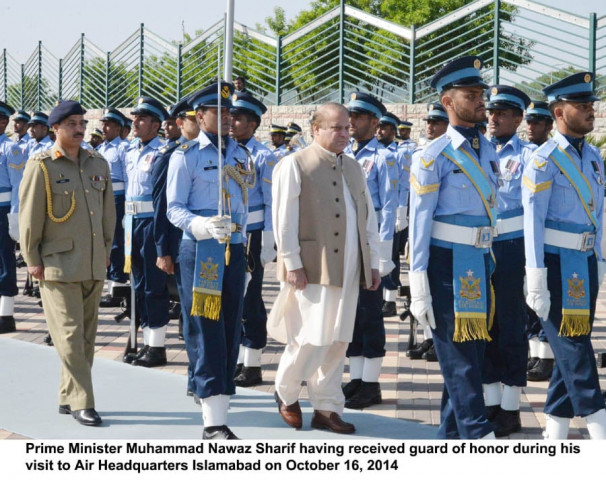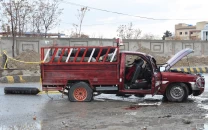21 ‘militants’ killed in Tirah Valley air blitz
Five hideouts destroyed; PM lauds PAF’s role in military operation.

21 ‘militants’ killed in Tirah Valley air blitz
As many as 21 suspected terrorists were killed in air strikes in the Khyber Agency’s Tirah Valley on Thursday, the Pakistan military said in a statement released the same day.
Five terrorist hideouts were also destroyed in the precise aerial strikes carried out as part of Operation Zarb-e-Azb, the statement issued by Inter-Services Public Relations (ISPR) said.
The latest air strikes came as Prime Minister Nawaz Sharif visited the Pakistan Air Force (PAF) headquarters and received a briefing on the service’s part in the ongoing operation being carried out in North Waziristan Agency (NWA).
The prime minister lauded PAF’s ‘lead role’ in Operation Zarb-e-Azb and assured full support to the force’s future development plans.
“The PAF leadership has done wonders in the past and will continue with the same as per the nation’s expectations. The PAF has always done extremely well,” he said. “We as a country and nation are proud of our heroes… and all those, who laid their lives in the line of duty.”
Premier Nawaz added that he was “fully convinced that the PAF is a viable and dynamic air force.”
Operation Zarb-e-Azb began on June 15 and the military claims to have killed more than 1,000 suspected militants so far. There is no clear timeframe regarding the completion of the operation.

The ongoing operation is not only vital for Pakistan but also being closely watched by the United States, which had been pushing the government for years to go after militants.
A senior US official on Thursday acknowledged that Operation Zarb-e-Azb ‘clearly disrupted militant activities’ but said that the job was not yet done.
“Militant groups, including the Haqqani Network and the Pakistani Taliban, continue to pose a threat to Pakistan, its neighbours and the US. It is vital that these operations continue, and that every effort is made to prevent the safe havens from being reconstituted,” US Special Representative for Afghanistan and Pakistan Dan Feldman told a Washington think tank.
Feldman, however, added the US strategic interest extends beyond the Haqqani Network or any other particular group.
The ungoverned vacuum allowed for a multitude of threats, both militant and criminal, that threaten first Pakistan, then the region, including Afghanistan, India and China, and then the broader world including the United States and Europe, he added.
“Eliminating these safe havens is not just about eliminating one group, or one leader. It is a job that requires continued vigilance,” the US special envoy said.
He further said this was an area where “we need continued cooperation between civilian government and the military, given their shared interests.”
While the military can clear a region, civilian administration is required to establish rule of law, extend the writ of government, and provide aid to IDPs, providing the enduring solution that closes the space for militancy, he maintained.
“It is Pakistan that has the clearest stake in this fight, as it is the Pakistani people who bear the brunt of terrorism today. The attacks in the past few months – including on a Pakistan Navy facility in Karachi – reveal the depth of the threat, and the serious risks of allowing violent extremists to find space to operate.”
“We have all appreciated the vocal leadership of many senior Pakistanis – including Prime Minister Nawaz Sharif and Chief of Army Staff Raheel Sharif – in this regard.”
PM’s meeting with air chief
During his visit to the PAF HQ, Prime Minister Nawaz held a meeting with Air Chief Marshal Tahir Rafique Butt and discussed matters pertaining to internal and external security.
The air force’s future developmental plans also came under discussion, with the premier pledging to provide all possible resources to the service. “We are committed to work out a programme to give more resources and funds to make up the deficiencies and transform PAF along modern lines,” he said. “Despite our resource constraints, whatever we have in our kitty will be provided to PAF.”
The prime minister was also told that the PAF had worked relentlessly for rescue and relief for the victims of recent flood in Punjab and Sindh. The air force flew 126 sorties and dropped 85,000 kg of relief goods in the affected areas.
Published in The Express Tribune, October 17th, 2014.



















COMMENTS
Comments are moderated and generally will be posted if they are on-topic and not abusive.
For more information, please see our Comments FAQ